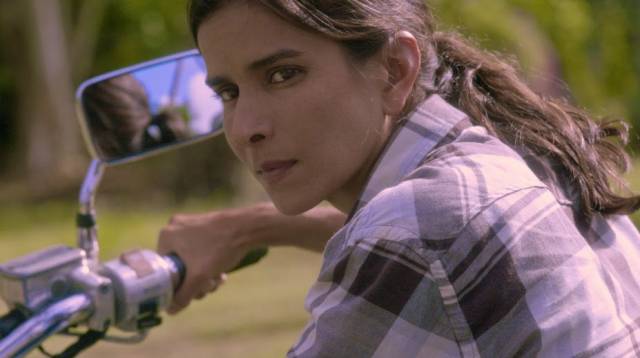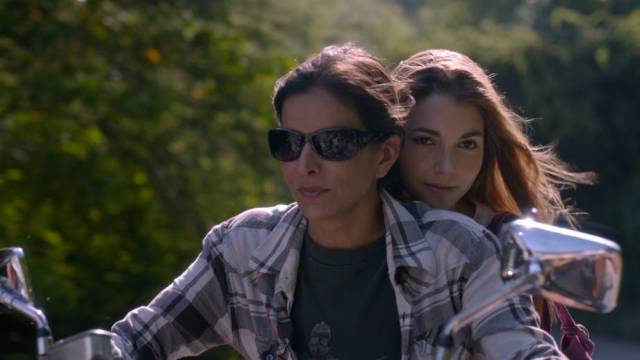
 From the runways of Dior and Dolce & Gabbana, to the exciting world of Hollywood blockbusters like The Mummy, and critically acclaimed television shows like Arrested Development and The L World, Patricia Velásquez has conquered it all, and yet, it seems that in her beautiful, soul searching work in Fina Torres’ Liz in September, we are encountering Patricia for the very first time. Playing the title character, she is both world weary and adventurous, compassionate and cryptic, a woman who truly contains multitudes. Based on Jane Chambers’ seminal play Last Summer at Bluefish Cove, Torres’ film strips down the plot to its basic elements, most of which have to do with female relationships that transcend sexual orientation and sexuality.
From the runways of Dior and Dolce & Gabbana, to the exciting world of Hollywood blockbusters like The Mummy, and critically acclaimed television shows like Arrested Development and The L World, Patricia Velásquez has conquered it all, and yet, it seems that in her beautiful, soul searching work in Fina Torres’ Liz in September, we are encountering Patricia for the very first time. Playing the title character, she is both world weary and adventurous, compassionate and cryptic, a woman who truly contains multitudes. Based on Jane Chambers’ seminal play Last Summer at Bluefish Cove, Torres’ film strips down the plot to its basic elements, most of which have to do with female relationships that transcend sexual orientation and sexuality.
The film has played several film festivals and was shown at NewFest in New York City in late October 2015. We had the opportunity to talk to the talented Velásquez about her work in the film, her autobiography and how we can get involved in her charity work.
I’m not sure if I’ve seen too many sad films recently, but I have to ask you, when you’re playing a part as emotional as Liz, do you think a lot about your own mortality?
Yes, I come from a school of acting in which I worked with coach Sandra Seacat, she’s very famous because she prepared Jessica Lange for Frances, so her way at preparing the actors was that if I was playing a doctor in the jungle, she would have me work in my garden and take the worms out, just things like that. She taught me at a very early age that scripts never come by coincidence, whatever’s going on in those pages is something you have to be very aware of. When Liz in September came to me it was a big reflection of the fragility of life, and it also deals with characters afraid of love and commitment, so definitely you reflect on that and try to find an encounter with yourself so to speak.
Fina Torres adapted the screenplay from a play by Jane Chambers, was there room in the screenplay for you to put some of yourself into Liz?
It’s such a gift to find a director that listens to the actors, because this means they’re a great director who will let you bring your suggestions to the table. Working on this film was beautiful, Fina and I, both being from Venezuela, were overdue to work together. We’d started working on another script she’d started in 1997, and I invited her to come to a master class I was taking with Ivana Chubbuck in Los Angeles where people like Charlize Theron and Halle Berry have studied. It’s a very safe place for actors to come and try things out, so Fina came to the class and as I was doing to a scene she realized I was going to do a scene from Jane Chambers’ original play called Last Summer at Bluefish Cove, which is probably the most famous lesbian play written in the 80s. When Fina saw the scene she brought up the fact she had tried to get the film done and it never took off, so maybe this was the right time to try again. Kudos to Fina, who could’ve easily done the film in English but wanted to make a statement, because there has never been a film like this done in Spanish. During the process I was heard a lot, she was so open, she always say Liz is a mix between the two of us.
You’re right, there are no other Spanish movies like this, which reminds me of the fact that when I was a kid I wanted so bad to have an action figure of your character from The Mummy, so as far as I’ve known of you, you’ve always been a Latina trailblazer, from supermodel, to actress, to author. Is that ever intimidating?
Thank you for your kind words. In my autobiography Straight Walk, I wanted to inspire people to live their own truths whatever it is they are, and in the book there is a chapter that talks how once I was walking down 16th and 8th in New York, and this girl came over and hugged me! I thought she was going to rob me, but she hugged me and started crying. I was really, really young, and the girl said “I just wanted to thank you because you helped my self esteem grow, you helped me understand that I am beautiful and you have changed my life”, I had no idea what I was doing, but after that moment everything took a turn, I realized I wasn’t only working to help my family and myself, but everything I was doing would impact many other girls that felt left out, that they weren’t good enough, that their beauty wasn’t their idea of beauty. I knew my work wasn’t only about me, so if I think about it selfishly, yes, it could be easy to get intimidated, but I try to think that our gifts, whether yours as a writer or mine as an actress, came from the universe and we are supposed to be channels to get this message out. When we try to take ownership of these gifts, things go down the drain, it shouldn’t be about our ego. There are also so many people who have achieved so much and are actually helping improve humanity, so I look up to these people, it helps me stay grounded.
 You wrote two versions of your autobiography, and at times you make readers feel like they’re reading your private journals. But it also helps people realize that we are the same, for instance as strange as it sound, both you and I had similar coming out experiences, and I’m sure you have heard this from many other people as well. I also found it curious that you felt like writing the Spanish version of the book was even more intimate because it meant your mother would be able to read it. How is it to balance these worlds?
You wrote two versions of your autobiography, and at times you make readers feel like they’re reading your private journals. But it also helps people realize that we are the same, for instance as strange as it sound, both you and I had similar coming out experiences, and I’m sure you have heard this from many other people as well. I also found it curious that you felt like writing the Spanish version of the book was even more intimate because it meant your mother would be able to read it. How is it to balance these worlds?
My mom hasn’t read the book yet (laughs), I told her I’d read some chapters to her, and it’s going to be the chapters I think are interesting to her. There are some things I don’t want her to hear, like my episode with Victor in Caracas, because they’ll make her feel bad about herself. First I thought I would just do the English version, but then I realized the Spanish version was also essential because it needed my voice, which might have been lost if someone just translated it. The English book is about a girl who grows up along with the book, but the Spanish version is someone looking back in retrospective. Both books are my story, but told in very different ways. The process was very challenging, and I’m sure you can relate to this, but making the Spanish version was harder. When I perform in English for instance I can go big, because I have a filter, the language protects me, but in Spanish you have no filter, you are raw. That was what made the process so special.
Patricia, let me ask you, how can we help your Wayuu Taya Foundation?
Thank you for asking! I think the most important thing is to spread the word. People think that for foundations to survive they need tons of money, but you have no idea, we take care of so many women and children on such a tiny budget, so really any dollar makes a difference. For us a dollar or ten thousand are the same, because we will find a way to make it work. Also, it’s not all money, if your strength is in writing, or graphic design, anything that we know how to do is so valuable in the world of foundations. Anything you know how to do, is exactly what we need.
Liz in September is now available on DVD and VOD.